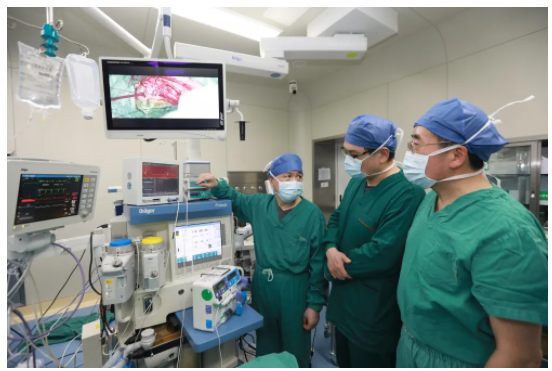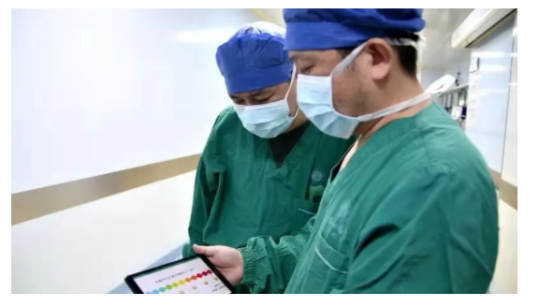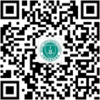During the past Chinese Anaesthesia Week, "pain" became a buzzy word again. People would be scared at the mere mention of surgery in the past. Now at Union Hospital, patients' experience of "pain" has long been radically changed.
Doctors at Anaesthesiology Dept., ranking among top five in Anaesthesiology Departments onChina's Hospital Rankings by Fudan University for four years in a row, fourth in the country and first in central China last year, are seasoned players, have intelligent "eyes", keep analgesia always "online" and help patients enjoy painless comfortable diagnosis and treatment, by preoperative "security check", ongoing "safeguard" and postoperative "analgesia".
Targeted, Individualized, Precise and Smart Anaesthesia System

Director Prof. CHEN Xiangdong (left) monitors the depth of anesthesia in a patient with the team
79-year-old grandma Li lives in Hanchuan and is suffering from torturous pains caused by worsening uterine prolapse. She was diagnosed with the 2nd grade of uterine prolapse when she came to Union Hospital last week. The doctors suggested a surgery be done as early as possible to rebuild pelvic floor function.
Being told that general anesthesia would be administered, her children began to panic, "could she survive anesthesia at her age?" Prof. CHEN Xiangdong, head of Anaesthesiology Dept., said in the preoperative conversation, "don't worry. Even for high-risk patient, we promise that she can fall asleep quietly and wake up safely."
On April 7, the old lady received the operation led by an expert in gynecology as scheduled. The old lady was in light sleep and breathing through trachea cannula. At this stage, the anesthesiologist was the "supervisor", while the "smart system" was administering anaesthetics.


Smart administration of anaesthetics
"It is very smart," Prof. CHEN Xiangdong said. Anesthesiologists would be very particular about the dosages of analgesics and sedatives, depending on the patient's age, weight and sensitiveness to drugs. The key is to calculate the drug concentration in blood vessels and the brain, which should be at exactly the right level so that the patient won't wake up suddenly during the operation because of underdosage, or on the contrary, be threatened by risks during the operation or wake up later than expected after the operation.
With the arrival of the era of comfortable healthcare, anaesthesia is applied throughout the process, from clinical examinations to treatment. In addition to administer drugs at a precise and stable speed, this high-precision anaesthesia system will automatically change the speed of drug delivery once it "perceives" insufficient drug concentration to protect patients from pain throughout the whole process.
A piece of self-adhesive electrode on the patient's forehead, and brain wave and other data were clear at a glance on the monitor next to her. "With it, the depth of anesthesia in the patient is under control completely," said Prof. CHEN Xiangdong. The electrode collects brain wave signals and runs automatic analysis, assigning a "score" to the depth of anesthesia. Once the score exceeds the safe threshold, the anesthesiologist or the smart electronic infusion pump will adjust the dosage immediately, improving anaesthesia precision.
Prof. CHEN Xiangdong also carried out genetic testing related to anaesthesia, which made it possible to anticipate a patient's degree of sensitivity to analgesia drugs. Based on such information, the type and dosage of drugs administered were adjusted and an anaesthesia plan was customized to each patient.
Big Data and “Cloud” Anaesthesia keep analgesia always "online"

Anesthesiologists keep track of postoperative pains in patients online
On April 12, in No. 2 Surgical Building at Union Hospital, anesthesiologist Dr. SONG Wentao was taking a short break after finishing several nonstop operations in the morning. He opened the database on a mobile device to view postoperative analgesia conditions of inpatients.
Dr. SONG Wentao noticed the system alarming on a mucosal laceration patient with postoperative analgesia pump. Via the terminal device, the anesthesiologist saw that the patient pressed the analgesia pump four times within 24 hours after the operation and the system gave out alarms. He contacted the attending doctor in the ward immediately. The patient was more sensitive to pains in the incision than others. Dr. SONG Wentao adjusted the dosage of analgesics and the patient calmed down immediately and felt much less painful.


Pain scores by patients
"Patients usually wear postoperative analgesia pump. The pain could be too much to tolerate during recovery. The doctors and nurses at the inpatient area will inform anesthesiologists, who might be busy with surgery and unable to come to the ward immediately," Dr. SONG Wentao said, the smart analgesia management system can pop up alarms once any patient feels pain after an operation, and they can make an evaluation and adjust the dosage as appropriate timely.
Traditional Chinese medicine combined with western medicine, little silver needles reduce anaesthetics

Prof. CHEN Xiangdong performs acupuncture analgesia on a patient
Does acupuncture anaesthesia work reliably? Prof. CHEN Xiangdong received a patient suffering from incomplete abortion recently, and doctors at Gynecology Dept. needed to perform a uterus cleaning on her. Before that, the doctors needed to use oxytocin to help expel the residual placenta. But once the drug was applied, the patient could not stand the pains caused by strong contractions. Prof. CHEN Xiangdong decided to perform acupuncture anaesthesia on her. The pains were alleviated immediately. The operation was completed without a hitch. More and more patients have benefited from this practice at the hospital.
Prof. CHEN Xiangdong who has background in western medicine has paid more attention to new anaesthetic practices combining traditional Chinese medicine and western medicine in the past couple of years. At present, he is leading the team to study different types of analgesia for incision pain, visceral pain, and inflammatory pain, for example.
"Acupuncture anaesthesia is not omnipotent," said Prof. CHEN Xiangdong. It is a complement to modern anaesthesia and can reduce the dosage of anaesthetics used in patients by 20%-30%, plus milder stress reaction, and quicker rehabilitation. All ensuing problems will be mitigated. "This approach has the potential to prevail in the future."
First AICU in central China provides a postoperative haven to patients
An anesthesiologist's work does not end with the completion of an operation. They accompany the patients through the critical period step by step from wake up, extubation to monitoring of vital signs.
Last month, a patient with tongue cancer received a successful operation but he was susceptible to air passage hydroncus, which might cause respiratory tract obstruction and hemorrhage, among other complications, during the 24-hour postoperative critical period, owing to the long-drawn-out operation with big wound surface. Postponed extubation could effectively reduce the risk and was good for postoperative recovery.


A nurse attends on a little patient who just received an operation at AICU
Anaesthesiology Dept. opened a new Anaesthesia ICU (AICU) in July 2019. After operation, patients are moved from the Operating Theatre to AICU directly, where anesthesiologists experienced in first aid for critical cases provide ward round and monitoring to help minimize pains in patients. After extubation, patients return to ordinary wards.
"All patients who have received level-4 operations, or cannot return to the wards safely and timely owing to complications during or after operation will be sent here to receive professional treatment," said Prof. CHEN Xiangdong. Anaesthesiology Dept. shoulders significant responsibility. "We are not in the slightest bit slack or negligent at our work. We have been working hard all the time to assure safety and comfort of our patients!"




